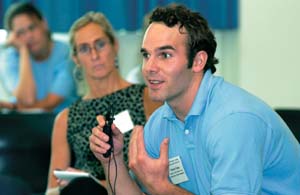 |
 |
| current issue |  |
past issues |  |
send a letter/news |  |
address update |  |
advertise |  |
about us |  |
alumni home |
Short Features
The Morning AfterEveryone agrees that the riots have to stop. Now the question becomes, how?
by Kim Billings '81

|
One University of New Hampshire police sergeant called it a scenario for "The Perfect Storm." A spring evening with temperatures in the 70s; students drinking; UNH vs. Minnesota in the national hockey championship game; and, in the late evening, a heart-breaking loss for UNH. "Everything exploded at 10 o'clock," recalls UNH police Sgt. Ron Welliver.
Although student unrest is not a new phenomenon--it was known in ancient Greece and has occurred in the United States since colonial times--incidents of celebratory disturbances have risen sharply in the last two decades. Similar episodes have taken place at colleges and universities across the country. In New Hampshire, for months afterward it would be referred to as the "Hockey Riot," when an estimated 4,000 people, many of them UNH students, took over part of Durham's downtown. In the end, students were arrested and sanctioned through the university's student conduct system, and UNH was in the spotlight for weeks afterward. Student leaders felt particularly caught in the middle between their peers and the administration.
"I remember standing on Main Street that night," recalls Sean Kay '03, former student body president. "So many things were going wrong. It was out of control, and all I could think about was the finger-pointing that I knew would happen on Monday morning: students blaming police, police blaming students, the town blaming the university. I didn't know what it would take, but I knew everything had to change. Not one thing, but everything."
In the coming days, Kay and other students began to think that UNH could become an agent of change. Reading the news, they could see that UNH was not the only campus dealing with student behavior problems, and in many cases other campuses were struggling with worse situations.

|
With the support of President Ann Weaver Hart, students were given the green light to plan a national student-led summit, the first of its kind in the nation, to examine, and seek solutions for, student unrest. In addition to supporting and attending the summit, the UNH administration has taken a number of steps to stem the rising tide of student disruptions.
The judicial process has been revised so that cases can be heard more quickly and students sanctioned more rapidly. Student rules have been revised so that crimes committed in downtown Durham can be taken through the student conduct process. President Hart wrote letters to students and to parents, reminding them of the responsibilities of good citizenship and the consequences of illegal behavior. Planning meetings have been held in advance of high-visibility weekends to highlight university-sponsored activities around campus. In addition, the University System of New Hampshire board of trustees revised the mandatory student fee policy so it can no longer be used for the legal representation of students for criminal offenses.
Page: 1 2 Next >Easy to print version
blog comments powered by Disqus

